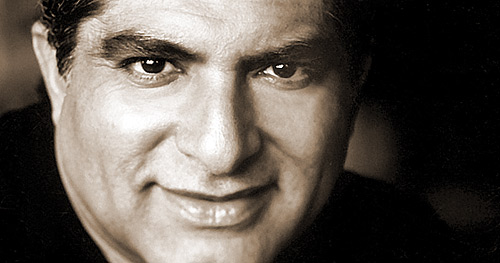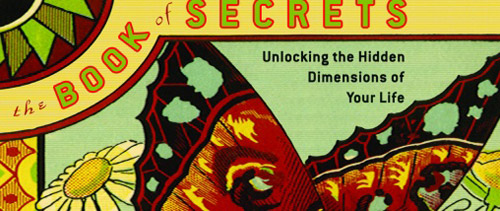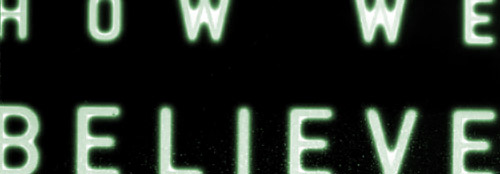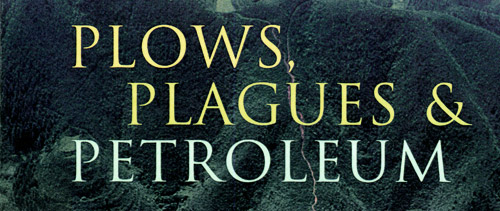
photo of Deepak Chopra by Jeremiah Sullivan
The Great Debate:
Deepak Chopra v. Michael Shermer
In this week’s eSkeptic Deepak Chopra and Michael Shermer debate The Value of Skepticism: Is Skepticism a Negative or a Positive for Science and Humanity?
This debate was initiated by Deepak Chopra after he and Michael Shermer exchanged blogs on HuffingtonPost.com (where they are both bloggers) on the topic of Intelligent Design. Deepak expressed his doubts about Intelligent Design Theory as it is presented for public school consumption, but suggested that there is scientific evidence of intelligent consciousness in the universe, as evidenced by findings from quantum physics.
Shermer posted a response in which he employed the philosopher Daniel Dennett’s evolutionary metaphor of cranes and skyhooks (in his book Darwin’s Dangerous Idea), where cranes build from the bottom up (natural selection) and skyhooks are invoked to explain design from the top down (intelligent design). Shermer suggested that Deepak’s intelligent consciousness is just another form of skyhook.
Deepak responded that Shermer’s view of science is too limited, and he listed a number of conundrums in science that he believes can better be explained through his view of science, or that at the very least are not being explained with mainstream science.
The following essay was submitted to Skeptic by Deepak as a further elaboration of his views on the limitations of skepticism. He invited Shermer to respond, which Shermer does at the end of Deepak’s essay.

Gadflies Without a Sting
The Downside of Skepticism
by Deepak Chopra, MD, FACP
“There is a field beyond all notions of right and wrong.
Come, meet me there.”
We live in a society where the worst humiliation, apparently, is to be duped. If Skeptic’s table of contents reflects the world, we are buried up to our necks in charlatans, pseudoscientists, scam artists, and the self-deluded. I cannot otherwise explain why being skeptical, without any additional positive contribution, is considered somehow admirable. I dislike skepticism when it sits by the road and shoots down any traveler trying to take a different way. I oppose skepticism when it turns destructive, using disdainful dismissiveness as its chief tactic.
Let me speak personally here as a target of skeptical critiques:
- I have rarely met a skeptic who didn’t use ad hominem attacks.
- Skeptics generally leap to the conclusion that I am naive, self-deluded, or simply unread in the sciences.
- Skeptics rarely examine the shaky assumptions of their own position.
- Skeptics believe that doubt is a positive attribute. (Skeptics in person can be appealing, usually in a kind of quirky misanthropic way, although most come off as self-important petty naysayers who try everyone’s patience.)
- Worst of all, skeptics take pride in defending the status quo and condemn the kind of open-minded inquiry that peers into the unknown.
Some debunking is laudable, and I have no problem with anyone who has punctured some form of charlatanism, but to call skepticism a wholesome, philosophically valid position goes too far. Skepticism is the attitude of doubt, or to dress it up for the dictionary, “the method of suspended judgment, systematic doubt, or criticism characteristic of skeptics.” But in my experience skeptics are overreachers. They equate doubt with logical thinking, so that to be unskeptical makes one irrational. The use of words like pseudoscience, magic, superstition, and ignorance bolsters their central claim that only fools and knaves occupy the low ground outside the skeptical tradition. But Keats, Beethoven, and Van Gogh all worked in irrational fields. And the line between religion and science, which skeptics defend like armed guards, isn’t so definite as they suppose, given the religious bent of Kepler, Newton, Einstein, and other scientific minds great and small.
At its most credible — here I want to show doubt in the best light — skepticism is the handmaiden of science and the scientific method. In and of itself, skepticism has made no actual contribution to science, just as music reviews in the newspaper make no contribution to the art of composition and book reviewing falls far short of writing books. Because it rides on science’s coattails, skepticism lays claim to defeating all manner of fallacies and ignorance when it has done no such thing. Skeptics have not contributed to theories of mathematics or logic in any substantial way, and the chief victory of skepticism — to discredit religious thinking as opposed to scientific thinking — is a battle long ago won.
But skeptics can’t wait to fight the battle again, and people like me, who discuss spirituality and science in the same breath, are vehemently accused of the same ignorant tendencies as fundamentalists waiting for Jesus to return tomorrow. So why be skeptical at all? What science has defeated is the great tradition of idealism. This tradition has hundreds of branches, but let’s accept the simple dictionary definition: idealism is “a theory that ultimate reality lies in a realm transcending phenomena.” By nature most people are idealistic. They accept God and have a will to believe. They are open to experiences beyond their five senses, such as love and beauty. They assume that there is an ultimate Truth.
Idealism thus persists in popular culture, but science has felled it on practically every academic front. To be honest, the assault was stunning, and victory was based on the simplest tactic. “Show me what you can prove, not what you believe.” Using experimental proof as its standard, science sent idealism scurrying in baffled confusion. Darwin defeated teleology, the age-old principle that Nature has a goal and purposeful design. Materialism relegated God to an unprovable hypothesis, along with everything associated with the numinous, such as the soul, the afterlife, and religious inspiration. Philosophy scrambled to shed Plato and Hegel and become scientific through the efforts of G. E. Moore and Wittgenstein, later morphing into the work of Austin and the ordinary language school of British philosophy.
Idealism failed to strike back. True, the French philosopher Henri Bergson, who theorized about an invisible life force or “elan vital,” won the Nobel Prize in 1926, but that was for literature, a stark acknowledgment that any theory about invisible realities deserved to be considered imaginary, or at best a matter of faith.
To say that the victory of science was the victory of skepticism is misleading, however. If science had been merely skeptical, it would have merely replaced belief with disbelief. This it didn’t do; science gave new grounds for knowledge that belief couldn’t match. To disdainfully dismiss any immaterial phenomenon, as skeptics do, actually betrays the scientific method, which allows any hypothesis into argument in an open-minded tolerance for the next ridiculous speculation that may turn out to be true.
Skeptics defend the necessity to keep science and religion in their own proper place. Imagine a man walking into a room, and the skeptic who is there to vet his credentials says, “Well, I see you believe in God, but you also do good science, so come on in. Just don’t mix the two.” It disturbs me that the man being vetted could be Albert Einstein, Wolfgang Pauli, or Erwin Schrodinger. Asking a great mind to separate faith and science asks too much, and I think it asks too much of lesser minds, too. Why not try to see if the schism can be repaired?
Science emerged from the Copernican revolution as the winner, the new paradigm, to use Thomas Kuhn’s famous term. But science is wrong if it believes it is the last paradigm or the only one that deserves credence. The nature of new paradigms, as Kuhn wrote, is that they explain more than the previous paradigm. Thermodynamics tells us more about heat than the medieval concept of phlogiston. Modern science explains a lot and keeps explaining more. But outside the fence one still perceives a host of inexplicable mysteries, and once it becomes respectable to approach them again, when God, consciousness, metaphysics, cosmic evolution, and meta-biology rid themselves of the taint of idealism, the next paradigm will emerge. It may happen through super-string theory or cyber theory or a field as yet unnamed.
If anyone doubts that these enigmas exist, please Google any term I’ve used here. Delve into the anthropic principle, Rupert Sheldrake’s morphogenetic fields, Susan Blackmore’s books on consciousness, current neurological theory as represented by Humberto Maturana’s and Francisco Varela’s The Tree of Knowledge, along with more imaginative but to me still insightful books by Lyall Watson. You will find countless sites and articles on the current state of speculative thought. If you are certain that I, or anyone like me, is a fool or a knave, keep searching until you find a writer you feel you can trust.
If you feel that nobody can be trusted, then keep your allegiance to skepticism, and enjoy its attitude of self-reinforced doubt.
Deepak Chopra, MD, FACP was formerly Chief of Staff of Boston Regional Medical Center and Assistant Clinical Professor of Socio-Medical Sciences at Boston University School of Medicine. He has taught at Harvard Medical School, Harvard Business School, and Harvard Divinity School. Hailed by Time magazine as one of the top 100 heroes and icons of the century, and credited as “the poet-prophet of alternative medicine,” Deepak Chopra is the author of more than 42 books that have been translated into 35 languages and sold over 20 million copies worldwide. His mission of “bridging the technological miracles of the west with the wisdom of the east” remains his thrust as he and his colleagues conduct public seminars and workshops and provide training for health care professionals around the world. www.chopra.com

The Power of Positive Skepticism
A Reply to Deepak Chopra
by Michael Shermer
“Most institutions demand unqualified faith;
but the institution of science makes skepticism a virtue.”
In Matthew 7, versus 1–2, Jesus admonishes his listeners: “Judge not, that ye be not judged. For with what judgment ye judge, ye shall be judged.” This is a warning against self-righteous severity, as elaborated on in the Talmudic collection of commentary on Jewish custom and law called the Mishnah: “Do not judge your fellow until you are in his position” (Aboth 2:5).
Deepak Chopra’s attitude toward skepticism is a common one we hear at Skeptic. Skeptics are said to be rigid, dogmatic, hypercritical, and closed-minded. We are accused of adding nothing to the fund of knowledge and wisdom, while we lurk in the shadows waiting for the opportunity to douse the flame of hope that resides in the belief in unlimited human potential and alternative realities.
Applying Jesus’ Judgment Principle, I begin by acknowledging that there are some skeptics who do indeed fit this description, and no doubt Deepak has encountered them in his very public crusade on the borderlands of science. (Big targets are easy to hit.) When I first became involved in the skeptics movement I met not a few grumpy old white guys complaining that the world was overrun with pseudoscience and superstitions, pronouncing the end of Western Civilization if we didn’t don our debunking caps and make the world safe for science and reason. Fair enough. There is some hyperbole there.
But the Jesus’ Judgment Principle cuts both ways. Skepticism has become a legitimate form of inquiry that Deepak parenthetically acknowledges (in a left-handed sort of way) as occasionally laudable, another refrain we often hear in the form of “I’m a skeptic too, but…,” where skepticism is fine as long as it is someone else’s codswallop under the microscope. When we made Deepak our cover story for Skeptic in 1998 (“Deepak’s Dangerous Dogmas,” Vol. 6, No. 2), I instructed the author, Phil Molé, to ignore the negative publicity in the news at that time about Deepak’s personal life, and instead focus strictly on his theories of quantum consciousness, health, and healing. There wasn’t a single line in the article that I would consider to be ad hominem. So there is a way to do positive skepticism.
This brings me to the larger issue of two forms of skepticism, negative and positive. Stephen Jay Gould began his foreword to my 1997 book, Why People Believe Weird Things, by noting: “Skepticism or debunking often receives the bad rap reserved for activities — like garbage disposal — that absolutely must be done for a safe and sane life, but seem either unglamorous or unworthy of overt celebration.” Deepak has identified the negative form of skepticism, debunking, but let’s be honest, there is a lot of bunk in the world. Members of the “bunko squads” of police departments are debunkers, and we do not bemoan their service to society in busting scams, schemes, swindles, and stings. Gresham’s Law — bad money drives good money out of circulation — applies to ideas as well. By weeding out bad ideas, negative skepticism enables the good to flourish.
Positive skepticism, however, involves much more than the negative disposal of false claims. In fact, the word “skeptic” comes from the Greek skeptikos, for “thoughtful.” According to the Oxford English Dictionary, “skeptical” has also been used to mean “inquiring,” “reflective,” and, with variations in the ancient Greek, “watchman” or “mark to aim at.” What a positive meaning for what we do! We are thoughtful, inquiring, and reflective, and we are the watchmen who guard against bad ideas in order to discover good ideas, consumer advocates of critical thinking who, through the guidelines of science, establish a mark at which to aim. “Proper debunking is done in the interest of an alternate model of explanation, not as a nihilistic exercise,” Gould concludes. “The alternate model is rationality itself, tied to moral decency — the most powerful joint instrument for good that our planet has ever known.”
Rationality, reason, science, skepticism — all are synonyms for activities in our quest to understand how the world works. The why of it all — the meaning, purpose, and spiritual fulfillment behind our quest — is a related but ancillary activity. Positive skepticism is a way of thinking that leads to deeper understanding, and it is a vital tool in the science kits of practicing scientists. In this sense I define science in a very pragmatic way: Science is what scientists do.
Deepak wants to bridge the schism between science and religion, which he says skeptics believe must be kept separate. We believe this because when scientists are doing science — collecting data, running experiments, testing hypotheses, building theories — we have nothing to say about religion, unless claims are made that scientific evidence supports some particular religious belief, such as that the Earth is only 6,000 years old or that intercessory prayer heals the sick. In that case, the ultimate result of applying the tools of science to religious claims can only be the disappearance or naturalization of the deity. Science deals with only natural causes. Any supernatural (or paranormal) causes, when examined closely, either disappear entirely or are incorporated into the natural sciences.
I think what Deepak is after here, however, is something broader and deeper than religion, and that is spirituality, a theme that comes up often in his books and public appearances. This past summer I was invited to teach a seminar at the Esalen Institute in Big Sur, California, the New Age Mecca on the Pacific coast. I called it “Science and Spirituality.” As it turns out, Deepak also once taught a seminar there under the same title, so either my students (mostly scientists) and I all sat around staring at the walls with nothing to say, or there is more than one way to be spiritual in this world. In my seminar, I defined the spirit as the pattern of information of which we are made — our genes, proteins, memories, and personalities. In this sense, spirituality is the quest to know the place of our spirit within the deep time of evolution and the deep space of the cosmos. Although there are many paths to spirituality, I believe that science gives us the deepest possible sense of grandeur and wonder about our place in time and space.
To which Deepak would probably proclaim “Me too!” (He writes quite positively about the harmony of science and spirituality in his books.) So I shall conclude by noting my epigram from Robert K. Merton that “science makes skepticism a virtue.” The science embraced by Deepak is much broader than that allowed by the evidence. Skeptical science is cautiously conservative. Deepak’s science is wildly speculative. In skepticism we have two canonical sayings: “Extraordinary claims require extraordinary evidence” and “Keep an open mind, but not so open that your brains fall out.”
The skeptical fences are there for a reason — to keep the borderlands of science from shading too far into pseudoscience, non-science, and nonsense. For every Copernicus, Newton, and Einstein, there were a thousand cons, cranks, and quacks with their revolutionary theories that turned out to be flummery and flapdoodle. Scientists don’t have the time or resources to shilly-shally with every new idea that comes down the pike. That is what the skeptics do, and as part of the scientific process this is the power of positive skepticism.
Dr. Michael Shermer is the Founding Publisher of Skeptic magazine, the Director of the Skeptics Society, a monthly columnist for Scientific American, and the host of the Skeptics Distinguished Science Lecture Series at the California Institute of Technology. He is the author of Science Friction: Where the Known Meets the Unknown, Denying History, How We Believe: Science, Skepticism, and the Search for God, and Why People Believe Weird Things. He was a college professor for 20 years (1979–1998), teaching psychology, evolution, and the history of science at Occidental College, California State University Los Angeles, and Glendale College. He has appeared on such shows as 20/20, Dateline, Charlie Rose, Larry King Live, Tom Snyder, Donahue, Oprah, Leeza, Unsolved Mysteries, and other shows as a skeptic of weird and extraordinary claims. www.skeptic.com

Plows, Plagues & Petroleum
Global Warming, Climate Change
& the Future of the Environment
Dr. William Ruddiman
Sunday, October 9th, 2pm
Baxter Lecture Hall, Caltech, Pasadena, CA
The impact on climate from 200 years of industrial development is an everyday fact of life, but did humankind’s active involvement in climate change really begin with the industrial revolution, as commonly believed? Dr. William Ruddiman, a climate scientist at the University of Virginia in Charlottesville and the author of the controversial new book, Plows, Plagues, and Petroleum, argues that humans have actually been changing the climate for some 8,000 years — as a result of the earlier discovery of agriculture. The “Ruddiman Hypothesis” has been controversial ever since it was featured as a cover story in Scientific American. It states that the impact of farming on greenhouse-gas levels, thousands of years before the industrial revolution, kept our planet notably warmer than if natural climate cycles had prevailed — quite possibly forestalling a new ice age.
Ruddiman takes us through three broad stages of human history: when nature was in control; when humans began to take control, discovering agriculture and affecting climate through carbon dioxide and methane emissions; and, finally, the more recent human impact on climate change. Along the way he raises the fascinating possibility that plagues, by depleting human populations, also affected reforestation and thus climate — as suggested by dips in greenhouse gases when major pandemics have occurred. The book concludes by looking to the future and critiquing the impact of special interest money on the global warming debate.









